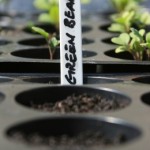Most Homesteaders are well-aware of growing crops organically. The
homesteading lifestyle actually supports and encourages an more-natural growing process than is typically used in commercial farming.
If you have not heard of the revived organic farming trend, then you must have been living under a rock or in a cave. The movement towards pesticide free produce and hormone free meats has been around since the 1960s, and then
during the 80s it died down but has recently undergone a revolution. More people want to know exactly what they are taking into their bodies. They want to know that the food they are eating is healthy. Although we don’t like the extensive regulations that are often thrust upon us, the USDA does exist to enforce organic regulations to ensure that nothing is marketed without passing their requirements.
There are two major components to organic farming. These two components are a ban on the use of pesticides and an agreement to not grow genetically manipulated crops.
Yes, agricultural research has come out with vegetables and other crops that are more resistant to pests, diseases and climatic changes but organic farmers and their customers believe that the benefits do not outweigh the significant risks associated with using genetically modified foods.
The ban on genetically altered crops is fairly recent. The other ban on pesticides and chemicals goes back to the 1930s. Even then some researchers were discovering links to illness through the overwhelming use of sprays and chemicals. Many small growers stopped using these chemicals. It was not only beneficial to the people eating the crops but it was also beneficial to the environment. Chemical run off is a huge problem with fields. The chemicals are sprayed onto the crops and then the chemicals seep into the soil and are washed away. The polluted water makes its way into streams and lakes where it can affect millions of people. Local farmers who have chosen to grow their crops organically may lose a certain percentage of their crops to pests but they are saving the environment around them in a huge way.
If you are not quite convinced that organic farming is right for you as a farmer, then you may need to seek out additional information. The USDA can provide you with guidelines for growing organically and can let you know the strict criteria for labeling a crop as organic. It may just seem like a passing trend to you initially but eventually you will come to realize how vast the organic movement is and how passionate people are for produce and crops that they can consume without worry. Making the switch will not be easy but it will be rewarding.





